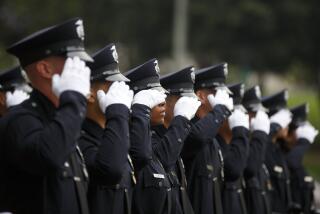Bar Panel Scrutinizes FBI Probes of Terrorists : Safeguards Sought for Lawful Dissent
- Share via
WASHINGTON — Reagan Administration rules for FBI investigations of domestic terrorism need “additional safeguards” to protect lawful dissent, an American Bar Assn. committee said Sunday.
Although the panel commended the guidelines as reflecting “a healthy degree of balance” between First Amendment rights and public security, it said “additional safeguards are necessary” because the rules expand investigative techniques available to FBI agents.
“For instance, the FBI may now recruit new informants in circumstances where it could not do so under old policy,” Eric Richard, chairman of the ABA’s individual rights panel, said.
“That is why close monitoring of whether informants limit themselves to reporting evidence of crimes, rather than on the political beliefs or opinions of suspects, is so important,” Richard, a special assistant for intelligence to Atty. Gen. Benjamin R. Civiletti during the Carter Administration, said.
Among its recommendations, the ABA committee urged that FBI field offices be required to inform superiors at the Washington headquarters before opening preliminary investigations involving domestic security.
“The guidelines require no such reporting, which will make it difficult to ascertain whether field agents are observing the guidelines’ requirements correctly,” Richard said.
The report also suggested that procedures be established at the FBI to describe the scope of a domestic security investigation in writing at an early point so agents can decide what records or information are pertinent.
“This will permit the FBI to avoid developing retrievable information about persons who are not implicated in any unlawful activity,” Richard said.
Atty. Gen. William French Smith, who announced the Reagan Administration’s revised guidelines in March, 1983, said in a statement that the ABA report “recognizes a critical public interest in protection from terrorist incidents and credits the Department of Justice with a sincere attempt to balance the protection of individual rights with its law enforcement and intelligence missions.”
“It should lay to rest some of the inaccurate criticisms that have been directed at the guidelines,” Smith said.
“The report does express some disagreement with the way particular portions of the guidelines are worded,” Smith’s statement said. “But such differences are common among lawyers and reflect issues of policy and style rather than fundamental disagreements on matters of law.”
When asked about that, Richard said, “This is far more than a discussion among lawyers. This is a discussion of fundamental constitutional questions.”
The guidelines issued in 1983 by Smith eased restrictions that were placed on various aspects of FBI investigations of domestic terrorism in 1976 by then-Atty. Gen. Edward H. Levi.
The ABA panel’s report said that the Levi guidelines “occupied a special place in the history of this country’s struggle to reconcile the demands of security and individual liberty.”
“They were issued in the wake of disclosure . . . of questionable activities by the FBI in monitoring the activities of domestic groups” seeking to bring about political change, it said.
But the report acknowledged that “protection of civil liberties is not, of course, the only public interest at stake.”
“There is a critical countervailing public interest in protection from terrorist incidents” that led to the Reagan Administration’s efforts to ease some of the investigative restrictions in the Levi guidelines, it said.
When the Levi guidelines were adopted, the report said, some 4,870 domestic security investigations were pending at the FBI. It said that by December, 1982, only 73 cases were pending and that when the Reagan Administration guidelines were adopted the following March, “substantially less” were pending.
The panel noted that its recommendations represent only the views of its members and said its report will be considered by the ABA’s policy-making House of Delegates at its annual meeting in July.
More to Read
Get the L.A. Times Politics newsletter
Deeply reported insights into legislation, politics and policy from Sacramento, Washington and beyond. In your inbox three times per week.
You may occasionally receive promotional content from the Los Angeles Times.










